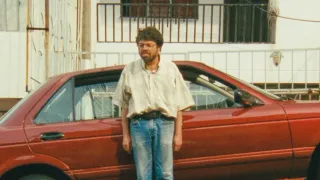March 26, 2017
LGBT Seniors Settle in at 55 Laguna
Matthew S. Bajko READ TIME: 5 MIN.
Having lived for eight years in the Ambassador, a converted single-room-occupancy hotel in the Tenderloin at the corner of Mason and Eddy streets, Ron Cordova had become inured to the constant whir of sirens outside his building.
But since moving two days prior to Christmas into 55 Laguna, the city's first affordable housing development designed specifically for LGBT seniors, Cordova has had to adjust to the quietness of his new apartment in the former college building known as Richardson Hall on the edge of the city's gay Castro district.
"It is dead quiet," said Cordova, 58, a gay man who is disabled and living with HIV. "Since I have been here, I have heard one siren. Where I had been living, I heard sirens daily."
Last summer, Cordova entered the lottery to select residents for 31 units in the renovated building, a $16 million joint venture between Openhouse, the LGBT senior services agency based in San Francisco, and Mercy Housing California, which develops below-market-rate housing. He landed on the waiting list at number 62.
But since eight units had initially been set aside for people aged 55 or older who are living with HIV or AIDS at risk of homelessness, Cordova received a call from the city's Shelter Plus Care program informing him it had an apartment for him at 55 Laguna if he wanted it. The program had been assisting him with his rent at the Ambassador.
"Mine was the last unit to be rented. It was a Christmas miracle," Cordova told the Bay Area Reporter during a visit last week to the building to meet some of the inaugural residents at what is being called the Openhouse Community at 55 Laguna.
Despite anti-discrimination laws that prevented city leaders from restricting heterosexual seniors from applying to live in the building, 68 percent of the seniors who moved in identify as LGBT, according to demographic data that Openhouse has collected.
Six percent of the residents identify as transgender, though Openhouse officials suspect the number may actually be higher. In terms of the residents' ethnic makeup, 57 percent are people of color (15 percent Asian/Pacific Islander, 17 percent African American, 15 percent Latino/Hispanic, and 11 percent other or biracial families).
Openhouse said that the oldest resident is 90.
The building consists of 10 studio apartments, 26 one-bedroom apartments, and four two-bedroom apartments for residents, plus an additional apartment for an on-site resident manager, who Openhouse said is Mercy Housing employee Lucinda Haas. The majority of the senior residents, 87 percent, live alone, while 13 percent are living with either a partner and/or other family members.
Worried that one day he would no longer be able to maneuver up and down the set of stairs at his former apartment on Sanchez Street in the Castro, Richard Nodine, 72, entered the lottery for 55 Laguna. He lucked out and was chosen for one of the 16 units set aside for people already living within a mile of the project or anywhere in the city's supervisorial District 8. He moved into his new apartment on December 19.
"The reason I was anxious to get in here is because I was living in a wonderful, old building but it had stairs," said Nodine, a gay man whose third floor studio apartment, decorated with various African baskets and photographic prints, is easily accessible via an elevator. "I am fine now and have no problems walking, but I was concerned for my future. I not only had stairs going into my building but also in my apartment."
Robin Rheault, 55, a transgender woman, moved into her apartment at 55 Laguna last fall after receiving a call from the Shelter Plus Care program, which had been housing her at the Ambassador the past three years. At first she thought they wanted to relocate her to a different Tenderloin building, but the person explained it was for the senior housing development.
(According to Openhouse, the city put the Shelter Plus Care program in charge of selecting the residents for the eight units that had been set aside specifically for seniors at risk for homelessness who are living with HIV or AIDS. The housing program, however, not only works with people who are HIV positive but also assists people who had been living on the streets or close to losing their home due to dealing with substance use or mental health issues.)
"I clutched my pearls and ran. I grabbed my cat and my coat in my other hand and said, 'I am here.' ... I really feel amazing being part of this movement," said Rheault, referring to the LGBT community. "We all need help, and it is nice to know that, at the end of the day, people have our backs. ... We really need this. The struggle is real."
Her new studio apartment is more than double the size of her previous one. Plus, being in a supportive senior housing environment, said Rheault, gives her peace of mind about aging as a single woman without her own children.
"I spoil my nieces so they will take care of me," joked Rheault, who grew more serious noting that she will turn 56 this year and is "closer to the end than the beginning. I want to know that pressure is gone."
She already has gotten to know her neighbors at 55 Laguna better than when she was living downtown, including four "trans sisters" who she said can knock on her door anytime. When Rheault grew depressed and didn't venture out of her apartment for four days, another resident noticed and knocked on her door to insist she join her for a walk outside.
"Even though it has only been a couple of months, we are building a sense of community," said Rheault.
Services
With funding from Mercy, Openhouse hired Amy Goodwin to serve as the resident services manager for the building. In addition to providing case management and helping the residents sign up for various community resources, Goodwin has been programming activities for them, from music concerts to field trips.
"This is my ideal population to work with and my ideal job," said Goodwin, 29, a gay woman who graduated in May from San Jose State with a master's in social work. "My goal is to help create a safe and welcoming community for everybody, but particularly a place where the LGBT residents can feel safe to be themselves and age with dignity."
The residents, leaders of the nonprofit agencies, and city officials will officially dedicate the opening of the building at a ceremony Thursday (March 23) at 3 p.m. It will also serve as the groundbreaking for the $40 million project's second phase, a new building with 79 units of affordable senior housing for people 65 and older, with 14 reserved for those at risk of being homeless, that will be built on what is now a surface parking lot next door to Richardson Hall.
Thursday's event will also mark the public unveiling of Openhouse's new, permanent offices at 65 Laguna Street, known as the Bob Ross LGBT Senior Center due to a $1 million donation from the foundation of the B.A.R. 's founding publisher. A bronze plaque honoring Ross, who died in 2003, greets everyone who enters the front door.
Construction of the new building, which will include 8,000 square feet of space Openhouse will use for community events and classes, is expected to kick into full gear in August and last through 2018. The residents, who will again mostly be chosen through a lottery, should move in sometime in early 2019.
"At 119 total units, this is the largest LGBT welcoming senior housing in the country," said Karyn Skultety, Ph.D., who joined Openhouse last month as its new executive director.






